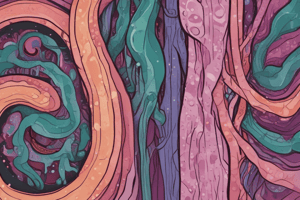Podcast
Questions and Answers
Which blood test result is more likely to be positive in Crohn's disease?
Which blood test result is more likely to be positive in Crohn's disease?
- Positive p-ANCA
- Mild anemia
- Elevated ESR (correct)
- Hypokalemia
What is a common characteristic of Ulcerative Colitis based on stool analysis?
What is a common characteristic of Ulcerative Colitis based on stool analysis?
- Low RBC count
- Elevated WBCs (correct)
- Presence of ova
- Negative for blood
What is a distinguishing radiological sign that may be seen in Crohn's disease?
What is a distinguishing radiological sign that may be seen in Crohn's disease?
- String sign (correct)
- CT scan shows cobblestoning
- Lead pipe appearance
- MRI showing no structural abnormalities
Which is a complication more commonly associated with Ulcerative Colitis?
Which is a complication more commonly associated with Ulcerative Colitis?
What is a common feature of Crohn's disease endoscopic appearance?
What is a common feature of Crohn's disease endoscopic appearance?
Which laboratory test result is more indicative of Ulcerative Colitis?
Which laboratory test result is more indicative of Ulcerative Colitis?
What is a potential complication specific to Crohn's disease?
What is a potential complication specific to Crohn's disease?
What is a characteristic feature of Ulcerative Colitis endoscopic findings?
What is a characteristic feature of Ulcerative Colitis endoscopic findings?
Which complication would NOT be typically seen in Ulcerative Colitis?
Which complication would NOT be typically seen in Ulcerative Colitis?
What treatment option is commonly used for both Ulcerative Colitis and Crohn's disease?
What treatment option is commonly used for both Ulcerative Colitis and Crohn's disease?
Flashcards
Ulcerative Colitis (UC)
Ulcerative Colitis (UC)
Inflammation of the mucosa and submucosa of the colon and rectum.
Crohn's Disease (CD)
Crohn's Disease (CD)
Transmural inflammation that can affect any part of the GI tract.
Fecal Leukocytes in IBD
Fecal Leukocytes in IBD
Used to help rule out infectious causes of diarrhea in IBD.
Colonoscopy in IBD
Colonoscopy in IBD
Signup and view all the flashcards
Transmural Involvement
Transmural Involvement
Signup and view all the flashcards
Skip Lesions
Skip Lesions
Signup and view all the flashcards
Crohn's Disease Presentation
Crohn's Disease Presentation
Signup and view all the flashcards
Skin Manifestations of IBD
Skin Manifestations of IBD
Signup and view all the flashcards
Hepatobiliary Complications of IBD
Hepatobiliary Complications of IBD
Signup and view all the flashcards
Crohn's Disease Activity Index Components
Crohn's Disease Activity Index Components
Signup and view all the flashcards
Study Notes
Inflammatory Bowel Disease (IBD)
- IBD includes Ulcerative Colitis (UC) and Crohn's Disease (CD)
- UC: inflammation of the mucosa and submucosa of the colon and rectum
- CD: transmural inflammation that can affect any part of the GI tract
Diagnostics
- Fecal leukocytes: to rule out infectious diarrhea
- Colonoscopy: to assess the extent of disease and the presence of any complications
Complications
- Iron deficiency anemia
- Hemorrhage
Crohn Disease vs Ulcerative Colitis
- Crohn Disease:
- Transmural involvement (intestinal wall from mucosa to serosa)
- Discontinuous involvement (skip lesions)
- Can involve any part of the GI tract
- Colectomy is not curative (recurrences occur)
- Complications: fistulae and abscesses are more common than in UC
- Extraintestinal manifestation: more common than in UC
- Ulcerative Colitis:
- Mucosa and submucosa involvement
- Confined to colon and rectum
- Colectomy is curative
- Continuous involvement (no skip lesions)
Crohn's Disease
- Anatomic distribution:
- Ileocolic (45%)
- Small bowel alone (33%)
- Colon alone (20%)
- Rectal sparing
- Clinical presentation:
- RLQ pain (postprandial) and palpable mass
- Diarrhea (watery)
- Rectal bleeding
- Malabsorption and weight loss
- Fever
- Growth retardation in children
- Perirectal fistula
- Extraintestinal manifestations:
- Skin: erythema nodosum, pyoderma gangrenosum
- Joints: peripheral arthritis, sacroiliitis, AS
- Eye: uveitis, episcleritis, iritis
- Hepatobiliary complications: gallstones, PSC
- Renal complications: nephrolithiasis, recurrent UTIs
Crohn's Disease Activity Index
- Liquid or very soft stools/day
- Abdominal pain and cramping
- Extraintestinal manifestations
- Complications
- Abdominal mass
- Use of anti-diarrheal medications
- Hematocrit
- Body weight
Extraintestinal Manifestations of IBD
- Eye lesions:
- Episcleritis: parallels bowel disease activity
- Anterior uveitis: independent course
- Skin lesions:
- Erythema nodosum: especially in Crohn disease; parallels bowel disease activity
- Pyoderma gangrenosum: especially in UC; parallels bowel disease activity in 50% of cases
- Arthritis:
- Migratory monoarticular arthritis: parallels bowel disease activity
- Ankylosing spondylitis: patients with UC have a 30 times greater incidence of ankylosing spondylitis than the general population; the course is independent of the colitis
- Sacroiliitis: does not parallel bowel disease activity
- Thromboembolic-hypercoagulable state: can lead to deep venous thrombosis (DVT), pulmonary embolism (PE), or a cardiovascular accident (CVA)
- Idiopathic thrombocytopenic purpura
- Osteoporosis
- Gallstones in Crohn disease (ileal involvement)
- Sclerosing cholangitis in UC
Studying That Suits You
Use AI to generate personalized quizzes and flashcards to suit your learning preferences.



